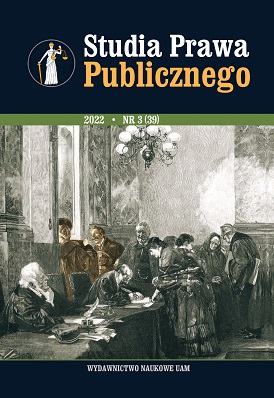Functions and tasks of the professional self-government of judicial officers
Funkcje oraz zadania samorządu zawodowego komorników sądowych
Author(s): Karol Kosiński, Piotr RączkaSubject(s): Administrative Law
Published by: Uniwersytet Adama Mickiewicza
Keywords: professional self-government; self-government of judicial officers; public tasks;
Summary/Abstract: The professional self-government, as a component of the decentralised public authority, is an institution which derives its legitimacy from the supreme legal act, the Constitution of Poland. Its basic framework is set out in Article 17(1) of the Constitution, according to which: “By means of a statute, self-governments may be created within a profession in which the public repose confidence, and such self-governments shall concern themselves with the proper practice of such professions in accordance with, and for the purpose of protecting, the public interest”. The ratio legis of this regulation is the possibility of statutory entrustment of certain professional corporations with the performance of public tasks in authoritative forms appropriate for public administration. This study presents of the functions and tasks that the legislator has provided for the professional self-government of judicial officers. Currently, the provision regulating the tasks performed by the judicial officers’ self-government is Article 195 of the Act of 22 March 2018 on judicial officers, according to which the tasks of the judicial officers’ self-government include in particular: 1) supporting the administrative supervisory bodies in supervising the conscientious performance of service by judicial officers and the proper performance of duties by assessors and trainees, 2) participating in ensuring the conditions for the performance of the statutory tasks of judicial officers, 3) representing judicial officers and assessors, 4) the professional development of judicial officers and assessors, and participation in the training of trainees, 5) establishing and promoting the principles of professional ethics and ensuring their observance, 6) conducting research into the functioning of judicial enforcement. The authors analyse the normative material regulating the issue in question. Looking through the prism of theoretical concepts of professional self-government, they also assess the legitimacy of the solutions adopted by the legislator. Consequently, they make de lege lata remarks and de lege ferenda postulates.
Journal: Studia Prawa Publicznego
- Issue Year: 39/2022
- Issue No: 3
- Page Range: 83-100
- Page Count: 18
- Language: Polish

